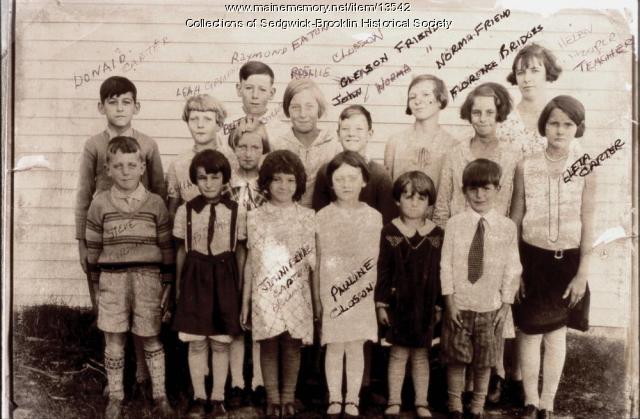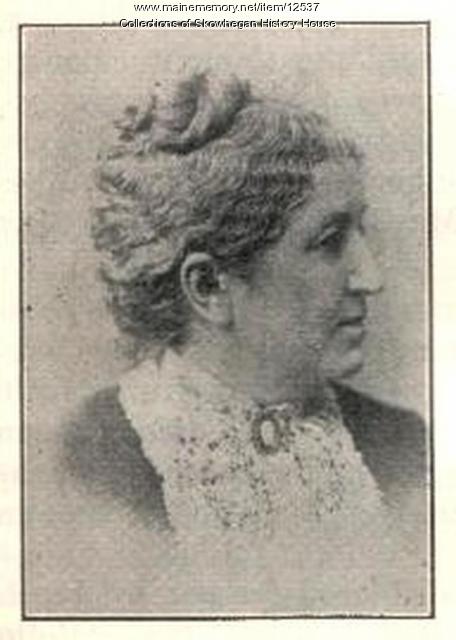Keywords: blue
- Historical Items (445)
- Tax Records (1)
- Architecture & Landscape (9)
- Online Exhibits (56)
- Site Pages (104)
- My Maine Stories (19)
- Lesson Plans (0)
Online Exhibits
Your results include these online exhibits. You also can view all of the site's exhibits, view a timeline of selected events in Maine History, and learn how to create your own exhibit. See featured exhibits or create your own exhibit
Exhibit
Post office clerks began collecting strong red, white, and blue string, rolling it onto a ball and passing it on to the next post office to express their support for the Union effort in the Civil War. Accompanying the ball was this paper scroll on which the clerks wrote messages and sometimes drew images.
Exhibit
Reading, Writing and 'Rithmetic: Brooklin Schools
When Brooklin, located on the Blue Hill Peninsula, was incorporated in 1849, there were ten school districts and nine one-room school houses. As the years went by, population changes affected the location and number of schools in the area. State requirements began to determine ways that student's education would be handled. Regardless, education of the Brooklin students always remained a high priority for the town.
Exhibit
Graduations -- and schools -- in the 19th through the first decade of the 20th century often were small affairs and sometimes featured student presentations that demonstrated what they had learned. They were not necessarily held in May or June, what later became the standard "end of the school year."
Exhibit
Maine and the Civil War - Bluehill Academy Journal, 1863
"… the Civil War by students at Bluehill Academy in Blue Hill, this student journal has a hand-drawn picture of a blue and red eagle carrying a banner…"
Exhibit
Music in Maine - Community Music
"… Festival Click to read about the North Atlantic Blues Festival The Roots of the North Atlantic Blues Festival By Paul Benjamin My parents brought…"
Exhibit
Rum, Riot, and Reform - Society Copes
"The chorus: I’ve got the blues I’ve got the blues I’ve got the alcoholic blues No more beer my heart to cheer Goodbye whiskey, you used to make me…"
Exhibit
Northern Threads: Civil War-era clothing
An exhibit vignette within "Northern Threads, Part 1," featuring American Civil War civilian and military clothing, 1860 to 1869.
Exhibit
Music in Maine - Bluegrass Music
"Performing around Maine for 20 years, the Blue Mountain Boys appeared regularly on Ken MacKenzie’s show and on a weekly live radio broadcast in…"
Exhibit
Rum, Riot, and Reform - Drinking Implements
"… Mug, 1780-1800 English Pearlware with underglaze blue painted decoration Courtesy of W.M. Schwind, Jr."
Exhibit
Music in Maine - Music in Maine
"… musical traditions, these influences layered blues, country, bluegrass, and rock and roll. Today, Maine music is a bountiful intersection from…"
Exhibit
By the second half of the 20th century, skiing began to enjoy unprecedented popularity. Pleasant Mountain in Bridgton (later Shawnee Peak) was Maine's foremost place to join the fun in the 1950s and 1960s.
Exhibit
Northern Threads: Bustle era fashions
A themed vignette within "Northern Threads Part I," featuring 1870s and 80s era bustle silhouettes.
Exhibit
Student Exhibit: Rebecca Sophie Clarke
Sophie May, whose real name was Rebecca Clarke, was the author of over 40 books between 1861 and 1903. She wrote the "Little Prudy Series" based on the little town of Norridgewock.
Exhibit
Fair Season: Crops, Livestock, and Entertainment
Agricultural fairs, intended to promote new techniques and better farming methods, have been held since the early 19th century. Before long, entertainments were added to the educational focus of the early fairs.
Exhibit
Maine Through the Eyes of George W. French
George French, a native of Kezar Falls and graduate of Bates College, worked at several jobs before turning to photography as his career. He served for many years as photographer for the Maine Development Commission, taking pictures intended to promote both development and tourism.
Exhibit
Imagery on letterhead soldiers used, on soldiers' memorials produced after the war, and on many other items captured the themes of the American Civil War: union, liberty, and freedom.
Exhibit
Meshach P. Larry: Civil War Letters
Meshach P. Larry, a Windham blacksmith, joined Maine's 17th Regiment Company H on August 18, 1862. Larry and his sister, Phebe, wrote to each other frequently during the Civil War, and his letters paint a vivid picture of the life of a soldier.
Exhibit
Maine's frozen rivers and lakes provided an economic opportunity. The state shipped thousands of tons of ice to ports along the East Coast and to the West Indies that workers had cut and packed in sawdust for shipment or later use.
Exhibit
Student Exhibit: Save the Skowhegan Grange & Granges in General
A brief history of the Grange in Skowhegan, its importance to community history, and a plea to save it from destruction.
Exhibit
Rum, Riot, and Reform - 1865 to 1919: The Drys Gain New Adherents and Leaders
"… in founding reform groups known for using red or blue ribbons as their symbols. Dr. Joseph E. Turner of Bath was one of the first medical…"
Exhibit
"… came from Litchfield, and the first song played on WBLM was The Story in Your Eyes by The Moody Blues. The station moved to Portland in 1988."
Exhibit
Following his historic flight across the Atlantic in May 1927, aviator Charles Lindbergh commenced a tour across America, greeted by cheering crowds at every stop. He was a day late for his speaking engagement in Portland, due to foggy conditions. Elise Fellows White wrote in her diary about seeing Lindbergh and his plane.
Exhibit
Northern Threads: Adaptive reuse
A themed vignette within "Northern Threads Part I," featuring up-cycled and reused historic fabrics.
Exhibit
Northern Threads: Early Republic era Fashion dolls
A themed exhibit vignette within "Northern Threads Part I," featuring Early Repulic-era (ca.1780-1820) fashion dolls.
























